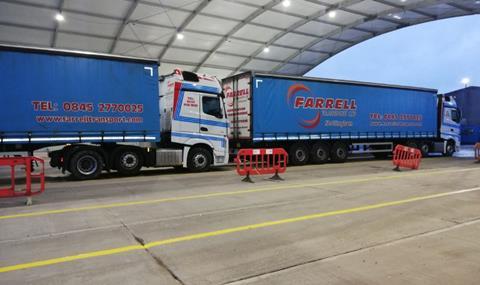
The impact of the COVID-19 outbreak could see suppliers going direct to hauliers for warehousing and scrapping their own to cut costs, according to an East Midlands operator.
Bob Farrell, MD of Nottinghamshire-based Farrell Transport, said the strategy was already being used by many of his customers and may become “the new norm” as the supply chain evolves in the wake of the pandemic.
“We’ve basically cut out the middle man,” Farrell told motortransport.co.uk. “We’ve seen our customers close the doors on their own businesses, and instead of us replenishing their warehouses with the stock we’ve got in ours, they’re furloughing their staff and sending the stock out from us.
“We’ve seen our warehousing side become very, very busy with extra containers coming in to us on top of the containers that we’re getting already. Our customers’ containers are also coming straight to us. So our own staff are sending freight out from us, which has kept the network busy and the warehouse busy as well.”
Farrell said the trend for outsourcing warehousing could become widely adopted by suppliers in the future: “Things are changing - the world’s changing,” he said. “Whether that’s going to be the new norm I don’t know.
“But businesses are obviously going to look at it and wonder if it’s worth their while having a warehouse and two or three people working in there when they can send it straight to Farrell’s, or our outside warehouses, and say ‘we don’t need our own warehouses anymore.’ They can reduce their staffing levels going forward.”
Read more
- Farrell Transport hails health benefits of new £500,000 canopy
- Demand for warehousing and distribution space up 10% in Q1
- COVID-19 “a huge industry wake-up call that puts many jobs at risk”, claims tech expert
“If you’re working for a company who’ve got their own warehouse you’ll have nervous employees at the moment. But if you’re working for a distribution company you’ll be taking on more work going forward.”
A Pallet Track member, Farrells was founded in 1987 and has grown into a multi-million pound turnover business offering over 100,000sq ft of warehousing.
The company boasts customers from many different sectors and owns all its own sites: “We’re very lucky with that,” Farrell continued, “and we’ve got buildings and offices sitting on the side. Maybe in the future, people are not going to want to open their own offices and warehouses and just look for small offices or work from home. We need to look at different ways of doing business. Things are changing and we’ve got to look at new ways of making money.”
Asked how much forward planning the company was able to do, Farrell said: “We’ve furloughed about 50% of the staff. You don’t know which way to go, whether to turn right or left. It’s very early days in knowing where the customer’s needs are going to be.
“I’m talking to customers daily, keeping feedback going with them. It’s the same with the furloughed staff, we make a daily phone call to every one of them to make sure they’re ok and to let them know they’re still part of the team.
“The guys who’ve been furloughed have got the rough end of the stick. Saturday becomes like a Wednesday. Every day is the same, it’s tough just sitting at home. I’m working six days a week, all the directors are having to do different bits."
Asked how the wider haulage sector was faring, Farrell said that although the company’s network is really busy, general haulage is “on its knees”.
“Every week another customer has furloughed everybody and shut down. We’re having meetings every couple of days on whether we’ve got to furlough staff that are still working or bring them back. We furloughed three last week and brought back two.
"We do everything from packaging material right through to food stuff, but a lot is into restaurants not supermarkets. All of that has just died."
"The building trade might kick in quickly when it comes back but the pub trade and food might take a long time to get back to normal."














